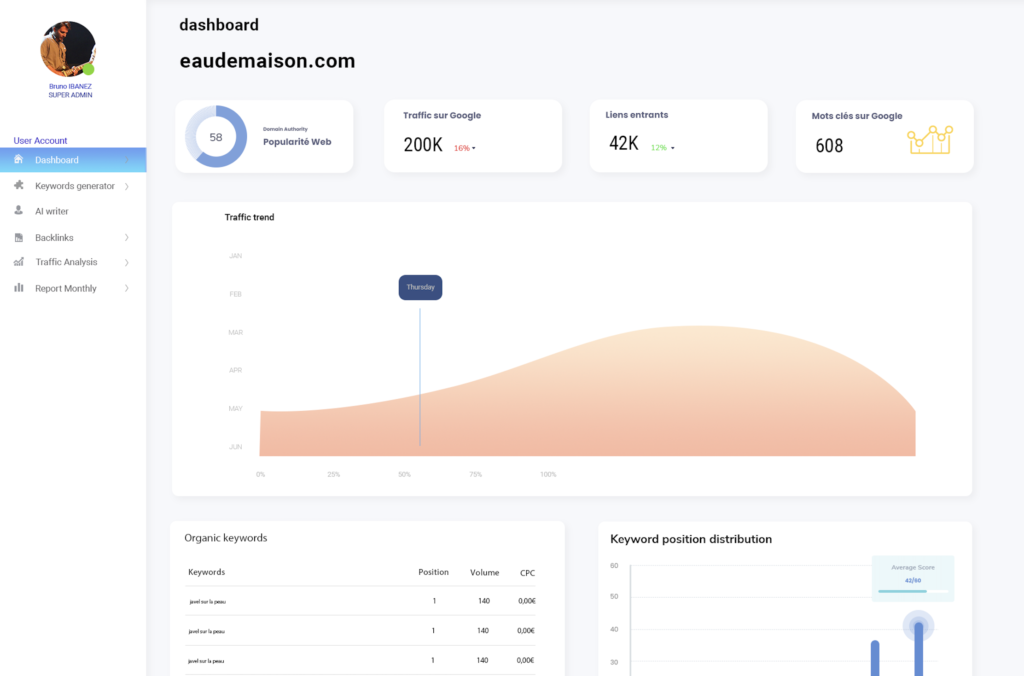

Search engine optimization, commonly known as SEO, is crucial for any website to gain visibility on search engines. However, there are certain pitfalls that can negatively impact your site’s SEO efforts. This article will walk you through the top 10 mistakes in SEO that you should avoid.
Table of Contents
ToggleIgnoring keyword research is a cardinal mistake in the realm of Search Engine Optimization (SEO). As the foundation of any successful SEO strategy, keywords play a pivotal role in how search engines understand and rank your website content. Bypassing keyword research can undermine your SEO efforts, leading to ineffectiveness in gaining visibility, attracting your target audience, and achieving desired conversions.
At the core, keyword research helps to expose the language your potential customers are using when searching online for the products, services, or content you offer. It’s about getting into the minds of your target audience, understanding their needs, their queries, and the exact phrases they’re typing into search bars. This information is instrumental in shaping your content strategy, optimizing your website, and providing a roadmap for creating content that meets your audience’s needs.
From an SEO perspective, using the right keywords helps search engines understand the context and relevance of your web pages, leading to better indexing and ranking. Keywords act as ‘signals’ that help search engines match your content with users’ search queries. By utilizing appropriate keywords, you make it easier for search engines to rank your site higher when users search for those specific terms.
When keyword research is ignored, the impact on your online presence can be significantly detrimental. Your content may fail to resonate with your target audience, not because it’s not valuable, but because it doesn’t match the search terms your potential customers are using. Without keyword research, you could be speaking a different language than your customers, leading to missed opportunities and decreased traffic.
Moreover, without carefully selected keywords, your content may not rank highly or appear in relevant search results, making it virtually invisible to your target audience. This could result in low site traffic, reduced engagement, and fewer conversions.
However, keyword research isn’t just about finding the most frequently used search terms and stuffing them into your content. The goal isn’t to integrate random keywords but to thoughtfully use those relevant to your business and frequently used by your target audience. Overusing or misusing keywords (a practice known as “keyword stuffing”) can lead to penalties from search engines.
In contrast, strategic use of keywords involves understanding and implementing long-tail keywords, local SEO keywords, and semantic SEO practices. Integrating these effectively into your content can significantly improve your visibility, increase organic traffic, and ultimately, lead to better conversion rates.
In conclusion, keyword research isn’t an optional SEO practice—it’s a necessity. It forms the backbone of your SEO strategy, offering a valuable way to connect with your target audience, increase your online visibility, and improve your website’s performance. Ignoring it can be one of the most damaging SEO mistakes you can make.

In the world of SEO, content is king. Search engines like Google favor websites that offer high-quality, informative, and engaging content. Creating poor-quality content that’s stuffed with keywords is not only a turn-off for your visitors, but it could also lead to penalties from search engines.
Meta descriptions play a significant role in attracting users to your website. They provide a brief overview of what your page is about, appearing under your page title in search engine results. Ignoring meta descriptions or writing vague, keyword-stuffed descriptions can be detrimental to your click-through rate.
With more than half of global internet traffic coming from mobile devices, it’s essential to ensure your website is mobile-friendly. A non-responsive website can provide a poor user experience for mobile visitors, which can negatively impact your SEO.
Alt tags are a way to describe images to search engines, which can’t read images like humans can. By ignoring alt tags, you miss out on the opportunity to boost your SEO and make your website more accessible.
Stay tuned for the remaining SEO mistakes in the upcoming section. But for now, remember that SEO isn’t just about ranking high on search engine result pages. It’s about providing value to your visitors and offering them the best user experience possible. For more insights on SEO, feel free to explore our blog or get in touch with our SEO agency.
Backlinks, which are links from other websites to your own, are considered endorsements in the eyes of search engines. When high-quality sites link to your content, search engines interpret it as a signal that your content is valuable and trustworthy. Thus, ignoring the potential of backlinks in boosting your SEO is a big mistake. For more about the importance of backlinks, check out our related article.
Internal links are links that go from one page on your website to another page on the same website. They are useful for three main reasons: they help website navigation, distribute page authority throughout the site, and enhance information hierarchy. If you fail to create a good internal linking structure, you are missing out on an essential aspect of SEO.
Page load speed is a crucial ranking factor. If your website takes too long to load, it can lead to a higher bounce rate, negatively impacting your website’s ranking. You can use tools like Google PageSpeed Insights to evaluate and improve your site’s loading speed.
While social media signals aren’t a direct ranking factor, they can indirectly influence your SEO. When your content gets shared on social media, it increases its visibility, potentially leading to more backlinks. Hence, a well-thought-out social media strategy can complement your SEO efforts.
Stay tuned for the last common SEO mistake, as well as a roundup of all the points we’ve discussed. And if your site’s traffic doesn’t seem to be taking off, don’t despair. Visit our dedicated article to learn how to rebound with SEO.
User experience (UX) plays a critical role in SEO. Google’s algorithm updates increasingly prioritize user-centric factors. A website that is hard to navigate, not mobile-friendly, or filled with intrusive interstitials and ads, will result in a poor user experience and thus, negatively impact your SEO efforts.
Also, understand that UX goes beyond just the website’s design. It includes ensuring your website loads quickly, the content is easy to read, and the website navigation is intuitive. So, if you want to boost your SEO, focus on providing a seamless and positive user experience.
In today’s digital era, the majority of online traffic comes from mobile devices. If your website isn’t optimized for mobile, you’re turning away a significant portion of your potential audience. Google’s Mobile-First Indexing makes mobile optimization not just a good-to-have, but a must-have. Make sure your website looks and functions just as well on a mobile device as it does on a desktop.
Website navigation is an essential part of UX and, consequently, SEO. A well-structured, intuitive navigation makes it easy for users to find what they’re looking for on your website, reducing bounce rates and increasing time on site, two key SEO metrics. An effective navigation should guide users to the information they’re seeking in the fewest clicks possible.

As mentioned before, page loading speed is crucial. In our fast-paced, on-demand world, users expect sites to load within seconds. Slow site speed can result in high bounce rates and low time-on-site metrics, hurting your SEO. Regularly test your site speed and make necessary improvements.
In conclusion, effective SEO is a meticulous process that involves various elements, from keyword optimization to backlinking, and from content quality to user experience. It’s essential to avoid these common pitfalls and continuously adapt to the ever-changing SEO landscape to ensure your website’s visibility and ranking in the search engine results pages.
Remember, SEO is not a one-time task, but a long-term commitment. Stay updated with the latest trends and algorithm updates. Continuous learning and adapting are keys to maintaining a successful SEO strategy. For more insights and tips, check out other articles on our blog.

Do you have a strategy for climbing the Google rankings?
Gain positions and qualified traffic with SEO

SEO Writer - CEO @hacktheseo
An expert in SEO since the launch of his e-commerce dedicated SAAS in 2016, Eric quickly grasped the significance of optimization for search engines to acquire new clients. Building on this expertise, he authored a book in 2019, published by Dunod, providing invaluable insights for succeeding in the e-commerce world. Recently, Eric introduced an innovative SAAS, leveraging artificial intelligence to assist entrepreneurs in enhancing their visibility on Google through simplified SEO.
How useful was this post?
Click on a star to rate it!
Average rating / 5. Vote count:
No votes so far! Be the first to rate this post.
Hack The SEO positions itself as a non-traditional marketing agency.
© 2024 Hack The SEO. All rights reserved.

Boost your visibility on Google with AI.
Reserved for the first 50!
Adding {{itemName}} to cart
Added {{itemName}} to cart
Permalink